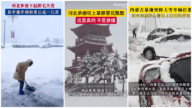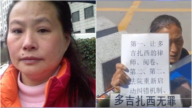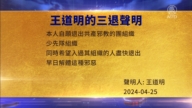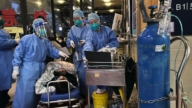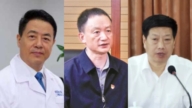【新唐人2011年5月16日讯】大陆媒体近日曝光了多部委第一次大规模对转基因作物做安全调查,同时,大陆很多反对转基因的专家学者表示,被禁止接受采访。有农业育种专家表示,中共操控的社会各界结成的利益链,将遗害中华民族子孙万代。
大陆媒体5月13号曝光了,由农业部、环保部、科技部和卫生部组成的四部委联合组,在山西、黑龙江、吉林、山东、广东等多个省份,进行中国第一次大规模转基因生物的安全调查。南方科技网指出,这相当于当局第一次承认了国内存在转基因作物种植的事实。
这使很多民众回想起,2010年两会期间,农业部副部长危朝安还在否认:农业部有批准转基因粮食种子进口到中国境内,作商业化种植,以及国内转基因粮食作物的商业化种植。
事实上,2009年10月22号,农业部就颁发了两种转基因水稻、一种转基因玉米的安全证书,使中国成为世界上首个转基因主粮商业化种植的国家。
因为转基因食品对人体的安全性在全世界还没有得到确切的证实,因此农业部的许可引发了全民和众多专家的强烈反对。
大陆媒体5月12号曝光,北京律师魏汝久去年5月曾起诉农业部,要求当局公开得到安全证书的转基因水稻在实验研究、中间试验、环境释放和生产性试验阶段的详细数据。
魏汝久律师是中华全国律师协会环境法专业委员会的委员,长期关注转基因问题。
魏汝久(中国律师):“就是希望信息公开,信息公开以后就会引起大家研究。应该听听NGO(非政府组织)的意见以及反对的声音。不让人知道不行,关注这个事情的人也比较多。希望大家都来看一下,它(转基因食品)到底现在是否安全。”
但是,北京市中级法院没有受理魏汝久的起诉,因为法院认为他作为律师跟转基因食品没有关系。
魏汝久律师认为,让大家知道转基因的真实情况,也能帮助医生有针对性的治疗相关疾病。
魏汝久(中国律师):“有些人如果说,某一类疾病出现的话,有经验的医生就会来研究,它到底是什么原因。如果说你把它转基因的有关信息公开以后,有助于这种治疗。有的人吃了含转基因制品的东西他会过敏的。这样的话他会有救急途径。如果什么都不知道,那就无从谈起。”
据本台特约记者调查,近期大陆很多反对转基因的教授和研究员被上级领导找去谈话,如果他们再敢接受媒体采访,就可能失去工作。
在5月上旬,国务院召开的关于转基因水稻的座谈会上,已退休的中国农科院育种专家佟屏亚,是现在极少数敢公开反对转基因食品的专家。
他直言,当局发给研究转基因的巨额经费,使得有些人为钱而支持转基因。据大陆媒体报导,2009年,当局对转基因生物新品种培育投入200亿元,比常规育种研究经费要多出几十倍乃至上百倍。
佟屏亚指出,农业部门的官员、农业大学的院士、种子公司的老板,结成了一条稳固的保护链和利益链,很可能遗患千秋万代。
新唐人记者吴惟、李若琳特约记者唐音采访报导。
Is GM Food Safe?
A recent large-scale investigation on safety
of Genetically Modified (GM) crops
conducted by ministries appeared on China’s media.
Anti-GM crops experts said that they were leaked
in media interviews. As Chinese Communist Party
(CCP) puts its interests first, crops breeding experts
regard GM harmful to all generations.
It’s reported on May 13 that 4 united ministries in
Agriculture, Environmental Protection, Technology
and Health made a large-scale GM crops safety
investigation in a number of regions in China.
Southern Science and Technology Network noted,
CCP admitted GM crops were planted domestically.
During 2010’s NPC and CPPCC (CCP conferences),
Wei Chaoan, vice-minister of agriculture ministry,
denied imports of GM crops
and the domestic commercial use of GM crops.
In fact, on October 22, 2009, Ministry of Agriculture
issued security certificates in two GM rice crops
and one GM corn crop. Since then China became
the first country to commercially use GM crops.
Given that GM food safety remains unknown,
the Ministry of Agriculture’s move stirred objections
from both citizens and experts.
It was reported on May 12 that Beijing lawyer
Wei Rujiu sued the Ministry of Agriculture last May,
calling for official safety research on GM rice
and detailed data in experiments,
environmental release, and productive test stages.
Lawer Wei Rujiu from the Environmental Law
Committee of China Lawyers Association
has long been concerned with GM food issues.
Wei Rujiu: “Transparency in information is desirable
followed by public scrutiny. Many are concerned,
including NGOs. People deserve to know
whether GM food is safe.”
Beijing intermediate court did not accept
Wei Rujiu’s appeal, for they stressed the irrelevance
between Wei’s lawyer identity and GM food.
Wei Rujiu said that the public awareness of GM food
can help doctors with the cure of relevant diseases.
Wei: “It is said that when some disease appears,
experienced doctors will come to investigate.
If information of GM food is made transparent,
it will help doctors in their research.
People who have allergic reactions
when consuming GM food can benefit
from specific medical treatment.
Therefore transparency of information is essential.”
NTD reported that lately a number of anti-GM food
professors and researchers were threatened
by CCP officials that they would lose their jobs
if they dared to give any media interviews.
In the 2010 GM food State Council conference
Dong Pingya, a retired breeder from China’s
Academy of Agricultural Sciences, was one
of the few experts who dared to openly oppose
genetically modified food.
He pointed out that some people support GM food,
owing to the large sums of fees authorities put in.
According to Chinese media, in 2009 RMB20 billion
was invested in producing new varieties of GM food,
10 to 100 times more than normal breeding research.
Dong Pingya said Agriculture Ministry authorities,
siding with Agricultural university heads
and seed company leaders, are evolving
an “interest chain", which will affect generations.
NTD reporters Wu Wei, Li Ruolin and Tang Yin


